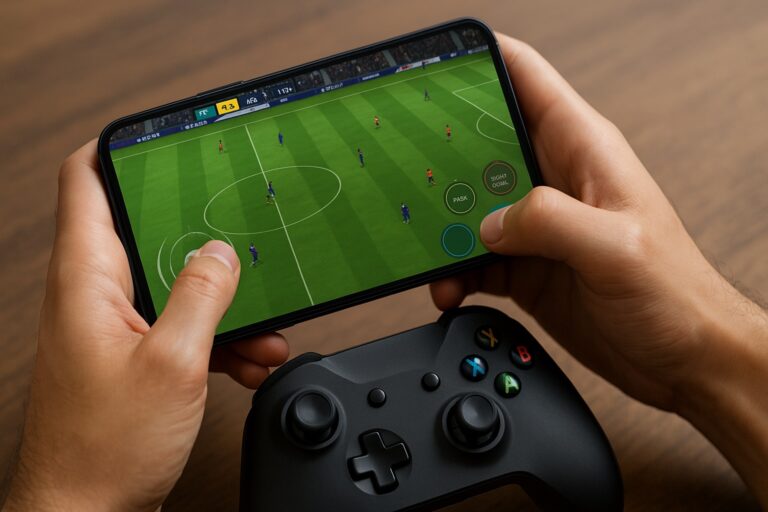Anúncios
Choosing between a gaming PC and a console is one of the most common dilemmas for those entering or upgrading in the world of gaming. Both platforms offer incredible experiences but cater to different needs, preferences, and budgets.
While some gamers prioritize performance and customization, others value simplicity and plug-and-play convenience. With new generations of consoles and powerful PC hardware becoming more accessible, the decision is no longer as straightforward as it once was.
To help you make the most informed decision possible, this guide compares both options from multiple angles—cost, performance, games, longevity, and more. Keep reading to discover which platform is right for your lifestyle and gaming goals.
Understanding Your Gaming Goals
Before diving into specs or prices, the most important question is: what kind of gamer are you? Your gaming goals should be the foundation of your decision. Are you looking for casual entertainment after work? Do you crave competitive gaming with high frame rates and custom settings? Or are you an aspiring content creator or streamer?
A console like the PlayStation or Xbox typically appeals to those who want a streamlined, easy-to-use gaming experience. On the other hand, a PC opens doors for those who value flexibility, upgrades, and multitasking — such as gaming, video editing, or programming all on the same machine.
Understanding what you expect from your gaming setup helps narrow down the options. A console might win for plug-and-play convenience, while a PC might suit your goals better if you’re into tweaking graphics, using mods, or future-proofing your setup.
Initial Investment and Cost Over Time
One of the biggest factors influencing the decision is budget — both initial and long-term. Consoles usually have a lower upfront cost. For example, a current-gen console like the Xbox Series X or PlayStation 5 may cost between $400 and $500. This includes everything you need to start playing right away: the console, a controller, and access to games.
A gaming PC, however, has a higher entry point. A decent prebuilt rig can start at $700, but high-end setups can easily surpass $2,000. You’ll also need peripherals like a monitor, keyboard, and mouse. While this seems steep, PCs often have lower game prices, frequent sales (like Steam), and no mandatory subscription for online play.
Over time, PC gamers may spend less if they avoid frequent hardware upgrades and buy games on sale. Console users, while saving initially, may end up paying for subscription services like Xbox Game Pass or PlayStation Plus annually, which adds to the total cost.
Game Library and Exclusive Titles
Both platforms offer thousands of games, but their libraries differ in key ways. Consoles have historically relied on exclusive titles to draw players in. Think of PlayStation hits like “God of War” and “The Last of Us,” or Xbox exclusives like “Halo” and “Forza.” These games are often optimized to perform perfectly on their respective consoles.
PCs, in contrast, have a broader and more diverse game catalog, including AAA titles, indie gems, mods, and early-access games not always available on console. PC also excels at backward compatibility — you can play games from 10+ years ago with no issues.
If you’re loyal to a specific franchise or developer that focuses on consoles, that may sway your decision. But if variety, mods, and cutting-edge releases matter more, PC is the way to go.
Performance, Graphics, and Hardware Customization
When it comes to raw power, high-end gaming PCs win — no question. PCs support ultra settings, higher frame rates, 4K or even 8K resolution, and ray tracing with fewer performance drops. They also allow you to upgrade individual components: CPU, GPU, RAM, and storage.
Modern consoles have closed the gap significantly. The PS5 and Xbox Series X offer 4K gaming, fast SSDs, and solid performance at lower prices. But you’re locked into their hardware until the next generation — usually every 6–7 years.
If you’re the type who wants to build or customize your rig for peak performance, or upgrade parts over time, the PC offers unmatched flexibility. But if you’re content with stable, high-quality graphics out of the box, a console delivers excellent performance with minimal effort.
Online Services and Ecosystem
Console platforms offer robust online services. Xbox Live and PlayStation Network give access to multiplayer, cloud saves, and free monthly games — but they come at a cost (typically around $60–$120 per year). These ecosystems are user-friendly, with curated content and social features like parties and voice chat.
On the PC, online play is typically free. Services like Steam, Epic Games Store, and GOG provide extensive game libraries, cloud saves, and social features. There’s no centralized subscription required, although platforms like EA Play or Xbox Game Pass for PC are available optionally.
PC users also have access to mods and third-party tools that enhance games and gameplay in ways consoles don’t allow. However, this open-ended nature can make setup and troubleshooting more complex.
Portability, Space, and Lifestyle Compatibility
If space is limited, or you prefer gaming in different rooms, consoles have a clear edge. They’re compact, quiet, and easily moved. Just plug into a TV and start playing. This is ideal for dorm rooms, living rooms, or family spaces.
Gaming PCs, especially desktops, are bulky and require a dedicated desk setup. They also need external monitors, power protection, and cable management. While gaming laptops offer portability, they tend to be more expensive and less powerful than desktops.
Consider your lifestyle. If you enjoy lounging on the couch with a controller or have limited room, consoles may suit you better. If you have a home office or plan to use your device for more than gaming, a PC offers greater value.
Longevity and Future-Proofing
How long will your investment last? Consoles are built for longevity — usually lasting 6–8 years without needing upgrades. Developers optimize games for console hardware to ensure consistent performance across all units of that generation.
PCs, while upgradable, require more frequent attention. A GPU that’s top-of-the-line today may struggle in 3–5 years with newer titles. However, the ability to upgrade individual components makes PCs more adaptable over time.
If you’re looking for a device that you won’t need to think about replacing for nearly a decade, consoles are attractive. But if you want a platform that evolves with your needs, PC’s modularity gives it the edge.
User Experience and Accessibility
Consoles are designed for accessibility. Setup is fast. Updates are automatic. Navigation is simple. There’s no need to worry about drivers, compatibility, or settings. Just insert a game and play.
PCs offer more control but require more effort. You may need to troubleshoot issues, adjust settings, or upgrade drivers. Some games might need patches or mod configurations. That said, once you learn the ecosystem, you gain much more power and personalization.
For users who want something that “just works,” consoles deliver. For users who enjoy tweaking and tailoring their experience, PCs provide unmatched versatility.
Who Should Choose a Console
You should choose a console if:
- You want a simple, affordable setup that works out of the box
- You prefer couch gaming with a controller and big-screen experience
- You don’t care about modding or upgrading hardware
- You enjoy exclusive franchises like God of War, Spider-Man, or Halo
- You want a consistent platform with minimal maintenance
Consoles are perfect for casual to intermediate gamers, families, or those who value stability and simplicity.
Who Should Choose a PC
You should choose a PC if:
- You want maximum control over performance, settings, and upgrades
- You enjoy mods, indie games, and experimental releases
- You use your device for more than just gaming (e.g., school, work, content creation)
- You value higher frame rates, better graphics, and multitasking
- You’re comfortable handling occasional technical tasks or research
PCs are ideal for gamers who also work from their machines, tech enthusiasts, or those seeking long-term value and flexibility.
Conclusion
Choosing between a gaming PC and a console depends on your personal goals, budget, and lifestyle. Consoles offer convenience, affordability, and excellent exclusive games in a user-friendly package. PCs deliver power, customization, and long-term flexibility with a steeper learning curve.
Neither option is objectively better — just better suited to different kinds of users. What matters is how you plan to use your device and what you expect from your gaming experience.
Consider your priorities, weigh the pros and cons above, and choose the platform that fits your world best.
FAQs
1. Is it cheaper to game on a console or PC in the long run?
It depends. Consoles are cheaper upfront, but PC gamers can save on game sales and free online multiplayer. Over time, costs may balance out.
2. Can I use a controller on a gaming PC?
Yes. Most modern controllers — including Xbox and PlayStation models — are compatible with PCs via USB or Bluetooth.
3. Do PCs have exclusive games like consoles do?
While PCs lack traditional “console exclusives,” they often get early-access games, indie titles, and modded content not available on consoles.
4. What about gaming laptops instead of desktops?
Gaming laptops offer portability but tend to be more expensive and less powerful than desktops at the same price point. They’re a good hybrid option for some users.
5. Which platform is better for competitive esports?
PC is the dominant platform for most esports due to higher frame rates, precise controls, and customization. However, some games have competitive console scenes too.



